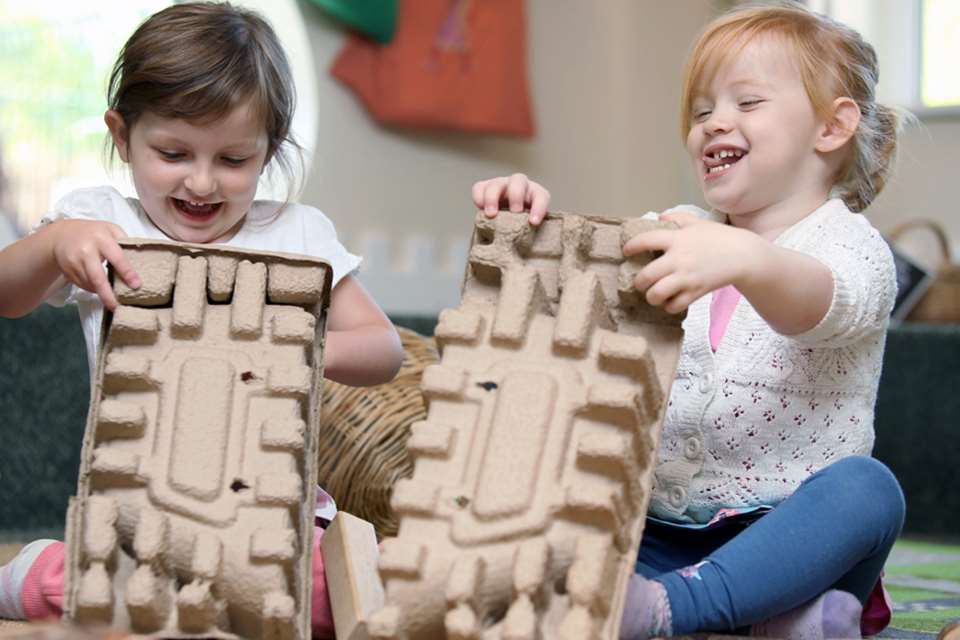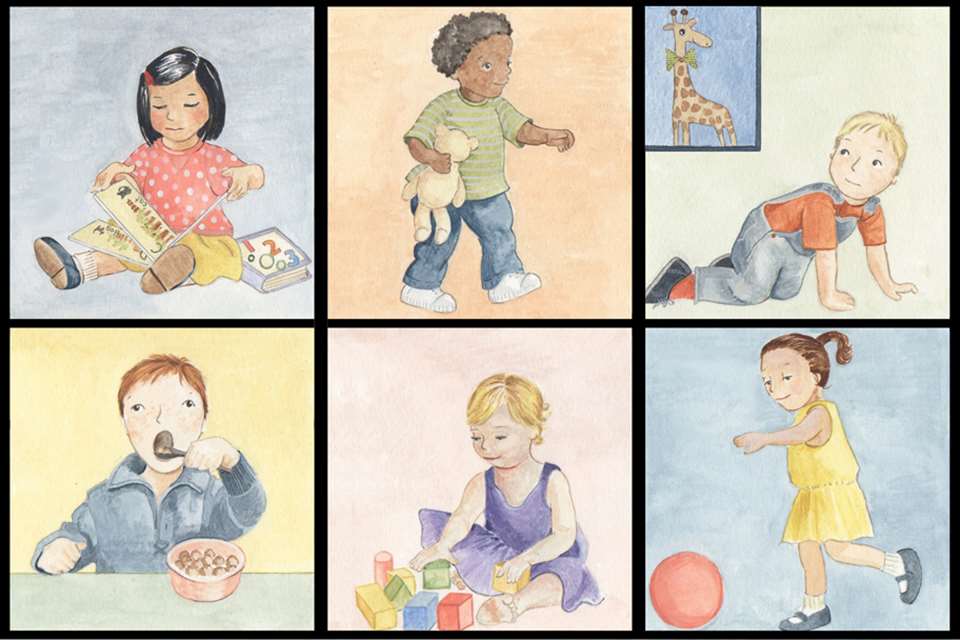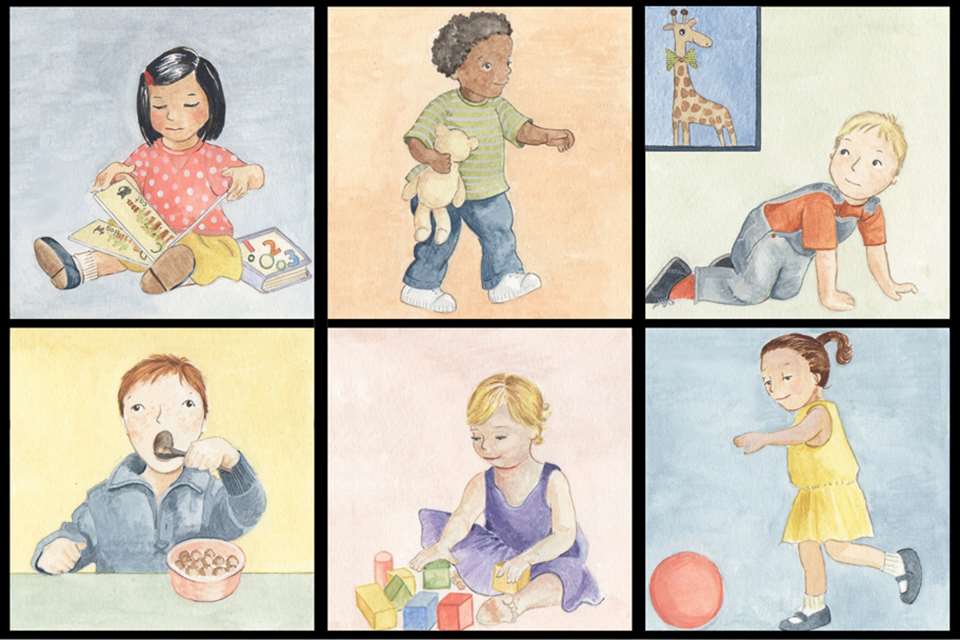A Unique Child: Integrated Review - In view
Ruth Thomson
Monday, November 30, 2015
How does the integrated review combine the Progress Check, Ages & Stages and the Healthy Child Review, and what do the different perspectives bring to the table? Dr Kay Mathieson explains

Few would disagree that each child is unique, their developmental progress, relationships and personality coming together in significantly different ways, even in siblings.
However, adult perceptions of a child also differ, depending on’ knowledge, experience and ability. An obvious example from early years practice would be how an adult may observe a child repetitively winding string round table legs and recognise this as related to schematic thinking.
Such developmental changes provide important insights into a child’s current and future progress and are apparent around the age of two, making it a useful time for a developmental review. In the integrated review of two-year-olds the main contributors – early years practitioners, health visitors and parents – will bring to the table their different perspectives about the child and these need to be respected and acknowledged to build a holistic picture of the child.
WHY AN INTEGRATED REVIEW?
Previously, health and early years practitioners have reviewed a child’s progress independently, often leading to confusion for parents. In addition, practitioners have only considered part of the developmental picture for a child. The advantages of an integrated review include:
- bringing together all available information for everyone to consider
- different perspectives, highlighting different issues and successes
- early intervention, and less chance of missing something.
In many cases, views from parents and practitioners will converge. However, differences of opinion and professional judgment are to be expected and welcomed as an opportunity to explore our thinking further.
The integrated review is a combination of these separate elements:
- Early Years Foundation Stage (EYFS) Progress Check
- Health Child Programme review
- parent-completed Ages & Stages Questionnaire (ASQ)
- discussion of the evidence, and informed decision-making about how best to support the child.
EARLY YEARS PERSPECTIVE
The EYFS Progress Check as described in the statutory framework states that when a child is aged between two and three, practitioners must review their progress, providing a short written summary of the child’s development in the Prime areas.
Explicitly, this process must identify a child’s strengths and any areas where progress is less than expected. Providers have the opportunity to include relevant information beyond the Prime areas, for example, sharing the Characteristics of Effective Learning as currently demonstrated by the child.
The Progress Check has been an element of effective practice in EYFS settings since 2012. Early years practitioners, through understanding of the Prime areas of learning, observe changes in a child’s development, awareness and abilities. For example:
Physical Development
From –
- crawling to running
- nappies to using the toilet
- being fed to eating independently.
Communication and Language
In –
- awareness of sound and attending to those of interest
- an evolving understanding and use of spoken words
- linking words with objects and routines
- using language to support connections with others.
Personal, Social and Emotional Development
In –
- extending relationships with adults and peers
- increasing awareness of shared meaning with others, including recognising emotions
- recognising themselves as individuals, and others’ perceptions of them
- increasing independence in simple everyday tasks.
However, it is essential that reflections include insights into the impact of progress in one area on that of another. An obvious example would be the impact on a child's self-esteem and confidence related to their physical abilities, including toileting.
HEALTH PERSPECTIVE
The Healthy Child Programme is the early intervention public health programme that guides health visiting team priorities. For families, this programme sets out the minimum five key visits they will have with a member of the health visiting team:
- around 28 weeks of pregnancy
- ten to 14 days following birth
- six to eight weeks
- nine to 12 months
- two to two-and-a-half years.
Individual health visitor caseloads vary geographically, but are often about 300 families. Health visiting teams include a mix of skills and specialisms to support the local community. There will be consistency for families in terms of the health visiting team they contact for advice or support, but this is unlikely to mean that they will have a named health visitor across the five visits listed above.
The Health Review at two to two-and-a-half years is an opportunity for the health practitioner to consider five key areas of development:
- Gross motor skills (walking and running, etc).
- Fine motor skills (manipulating toys, crayons, etc).
- Vision (recognition of everyday objects, etc).
- Communication and hearing (naming objects, combining words, making needs known, etc).
- Social skills and behaviour, (meaningful toy play, curious etc).
The health practitioner will have information from previous reviews and any direct contact with the family to set the context for the child’s progress since the previous review.
The crossover with the Prime areas of the EYFS helps to ensure that the inter-relatedness of progress across these areas is central to assessment and discussion. If there are evident difficulties in one area, this is likely to have implications for at least one of the other Prime areas of learning.
PARENT PERSPECTIVE
To support parents to share key information, the ASQ is provided. Parents are encouraged to engage their child in fun activities, then to record their response. The process supports reflection on their child’s overall progress and specific aspects of development. Once complete, the questionnaire is then brought to the review to share with the health and early years practitioners.
There are several versions of the ASQ, each applicable to particular ages. Most commonly, the 27-month questionnaire is used in relation to the integrated review, although this is a local strategic decision so may vary.
The questionnaire focuses on five areas of development with an additional overview of the child’s progress. Parents are asked to indicate if their child ‘regularly’, ‘sometimes’ or is ‘not yet’ able to demonstrate particular responses in the following areas.
1. Communication (following instructions, naming objects, etc)
2. Gross motor (climbing stairs, walking, jumping, kick a ball, etc)
3. Fine motor (drawing, threading, winding up toys, screw lids, etc)
4. Problem-solving (pretend play, finding ways to get things they can not reach, etc)
5. Personal, social (copying facial gestures, mealtimes, independence, etc)
The ‘overall’ section provides prompts to consider their child’s hearing, sight, progress relative to other children and behaviour or to note any worries or concerns they wish to discuss.
HOLISTIC VIEW
The ASQ is a tool to facilitate further discussion and highlight particular concerns that the parents may have. It is important they are reassured that this is not a test for their child but rather an opportunity to share the range of current information available about their child’s development.
The summary of the ASQ (completed by the health practitioner) is intended to be collated locally and nationally to build a picture of typical progress for children at this age. The information will also inform the development of services for early identification and intervention.
Bringing together parents, early years and health practitioners allows for a holistic view of development. This integrated thinking increases the chances that appropriate help, support and advice will be offered in a timely way. Each contributor brings different insights about the child. These will include the following.
Parents
- Seeing their child in a range of contexts and situations from birth.
- Having specialist knowledge about their child and the family context.
- Overview but experience of significant highlights and lowlights.
- Interest and potential anxiety about progress relative to general population and if all is on track.
Early years practitioners
- Specialist child development knowledge, including related to EYFS Prime areas.
- Early intervention in day-to-day activities, comparative understanding of progress from an individual child perspective across time and in relation to the current cohort of children.
- Experience of children establishing and maintaining independent relationships outside of the family network.
- Daily/weekly relationship with child and family over period of time able to identify trends in strengths and difficulties.
Health practitioners
- Health practitioners see the child infrequently, but have health-related knowledge of the family.
- Specialist child development awareness of early signs of medical inconsistencies or concerns.
- Early intervention access and referral routes, thresholds for referral.
- Periodic view of progress across five reviews.
In most local authorities, each early years setting is being allocated a named health practitioner to support the implementation of the integrated review. There are several possible models for completing the process, ranging from timely sharing of information through to the ‘gold standard’ of practitioners, parents and child together in a shared activity. However, this integrated working is not just about completing this review for our two-year-olds. It is a fantastic opportunity to work more closely with colleagues from different traditions, enhancing the experience for families and improving the life chances of our youngest children.
MORE INFORMATION
Healthy Child Programme and Integrated Review information, www.foundationyears.org.uk
Inclusion in the EYFS, K Mathieson. (2015, Open University Press, McGraw-Hill Education
Integrated review supporting materials, National Children's Bureau (2015), available from www.ncb.org.uk
Statutory Framework for the Early Years Foundation Stage, Department for Education (2014)
[asset_library_tag 1037,Download the PDF]








